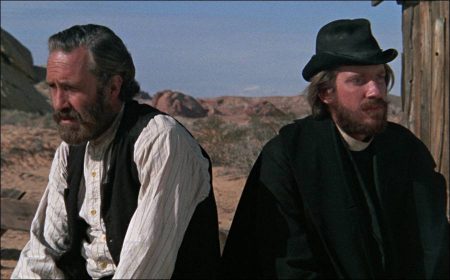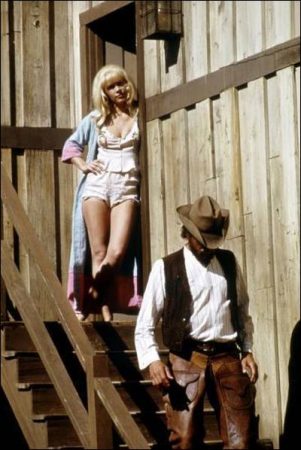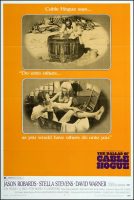Taglines: Cable Hogue says…”Do unto others… as you would have others do unto you.”
The Ballad of Cable Hogue movie storyline. Cable Hogue is a prospector who is abandoned in the desert, with no water, by his so-called partners. Nearing death, he discovers a natural spring and he’s soon at the nearest town to register a land claim. There he meets a pretty local prostitute, Hildy. Back at his claim site, he christens it Cable Springs and opens a stagecoach station where the horses can be watered and the passengers fed.
Hildy soon joins him but only temporarily as she has dreams of moving to San Francisco and setting herself up there in her own popular line of business. Things are going well for Cable when, to his delight, his former partners show up. This time he’s prepared for them. When Hildy returns after a long absence he’s ready to pack it in and make his life with her but as is so often the case, fate intervenes.
The Ballad of Cable Hogue is a 1970 American Technicolor Western film directed by Sam Peckinpah and starring Jason Robards, Stella Stevens and David Warner. Set in the Arizona desert during a period when the frontier was closing, the film follows three years in the life of a failed prospector. While unmistakably a Western, the movie is unconventional for the genre and for the director. It contains only a few brief scenes of violence and gunplay, relying more on a subtly crafted story that could better be characterized as comedic in nature.
Sam Peckinpah followed his violent, critically acclaimed 1969 film The Wild Bunch with this mostly non-violent Western. Utilizing many of the same cast (L.Q. Jones, Strother Martin) and crew members of The Wild Bunch, Peckinpah shot on location in the desert of Nevada and Apacheland Movie Ranch located in Apache Junction, Arizona. The production was plagued by poor weather, Peckinpah’s renewed alcohol consumption and his brusque firing of 36 crew members. When unable to shoot due to weather conditions, the cast and crew would go to a local bar, eventually running up a tab of $70,000.
The chaotic filming wrapped 19 days over schedule and $3 million over budget, terminating his tenure with Warner Bros.-Seven Arts. In retrospect, it was a damaging career move. The critical and box office hits Deliverance (1972) and Jeremiah Johnson (1972) were in development at the time and Peckinpah was considered the first choice to direct them.[4] His alienation of Warner Brothers left him with a limited number of directing jobs. Peckinpah was forced to do a 180-degree turn from The Ballad of Cable Hogue and traveled to England to direct Straw Dogs (1971), one of his darkest and most psychologically disturbing films.
The Ballad of Cable Hogue has an original score by Jerry Goldsmith and songs by Richard Gillis. Each of the main characters has a theme: Hogue’s “Tomorrow is the Song I Sing”, Hildy’s “Butterfly Morning”, and Joshua’s “Wait for Me, Sunrise.” The soundtrack was eventually released in 2001, by Varèse Sarabande in a limited edition album of only 3000 copies.
The Ballad of Cable Hogue had an operating budget of $3,716,946. The film earned $5,000,000 worldwide, with $3,500,000 in box office sales in the United States, and an additional $1,500,000 internationally.
Welsh musician John Cale wrote and recorded a song titled “Cable Hogue” for his 1975 album Helen of Troy. Tucson band Calexico wrote a song called “Ballad Of Cable Hogue” on their 2000 album Hot Rail, which shares similar lyrical themes to the plot of the film.
The Ballad of Cable Hogue (1970)
Directed by: Sam Peckinpah
Starring: Jason Robards, Stella Stevens, David Warner, Strother Martin, Slim Pickens, Peter Whitney, Gene Evans, William Mims, Kathleen Freeman, Susan O’Connell, Vaughn Taylor
Screenplay by: John Crawford, Edmund Penney
Production Design by: George Templeton
Cinematography by: Lucien Ballard
Film Editing by: Lou Lombardo
Set Decoration by: Jack Mills
Art Direction by: Leroy Coleman
Music by: Jerry Goldsmith, Richard Gillis
MPAA Rating: None.
Distributed by: Warner Bros. Pictures
Release Date: March 18, 1970 (Los Angeles)
Views: 536


